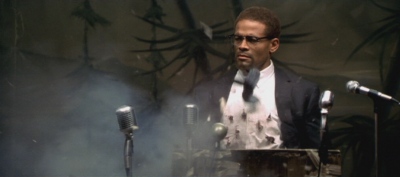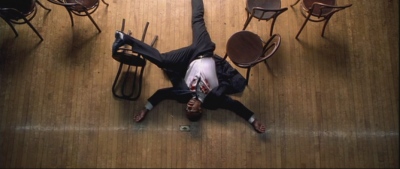|
1974 represented the end of the era of revolt, marked by two symbolic moments. Nixon resigned in August, and Ali miraculously regained his world title two months later, not by decree, but in the ring against big George Foreman. The revolution was over. We won. Ali, as our official generational symbol, also won. The movie ends with Howard Cosell's voice ringing in our ears, "Muhammed Ali has done the impossible. He has regained the title which was unfairly taken from him so many years ago." Ol' Howard wasn't too objective, but he was right. Although having lost the best years of his boxing life, and universally considered too old to take the crown from Foreman in 1974, Ali triumphed that day, and continued to fight for seven more years. He last won a title bout in 1978, when he was rapidly approaching 37 years old. I guess you can tell from my tone that it's hard for me to remain dispassionate about this film, which covers the period from 1964, when Ali first won the heavyweight title, to 1974, when he won it back. So is it good? Yes. It isn't without flaws, but it is very good.
Is it a mass-audience crowd-pleaser? Regrettably not. It is 157 minutes long, artistic, and it tries to cover too much, thus losing focus in the early going. Each of Ali's major lovers is introduced, none of whom had much bearing on the rest of the story, all of whom could have been cut without losing a thing. Short shrift is also given to the strained relationship between Ali and the Nation of Islam, the schism in the Nation itself, and the tension between Ali and his biological father. It's not that there weren't great moments in these sub-plots, but rather that there were too many of them and they didn't always fit well into the pacing of the narrative. I don't have any idea, for example, why they introduced Malcolm X into the story at all. I'm sure his relationship with Ali was probably an interesting story, but it wasn't THIS story, and I sure don't know what was interesting about it after having watched this movie twice. |
|||||
|
Did I like the film? Well, read the last word of the previous paragraph. The sucker is more than two and a half hours long, and I watched it twice in a row. And I liked it better the second time. I think that tells you that it had some magnetic moments that drew me back. What more can you ask of a film? |
||||
| Surprisingly for such a professional movie, it has a very obvious continuity error. See Malcolm X get shot in the lower half of his shirt (left), but the next scene shows him with the wounds much higher, and no holes or blood in the lower half of his shirt. | |||||
|
|
|
||||
|
|||||
|
|||||


